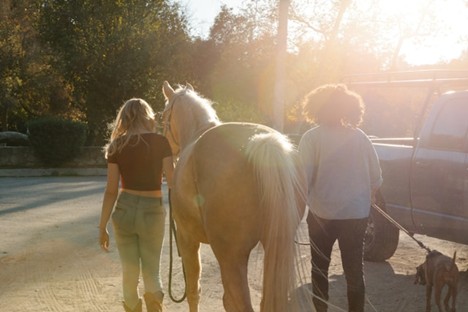
When adolescents enter residential healing programs, they often bring with them emotional challenges, behavioral struggles, or difficult life experiences that cannot be fully addressed through traditional talk therapy alone. Many programs incorporate holistic methods designed to engage the mind, body, and spirit, creating a comprehensive approach to healing. One of the most impactful of these strategies is equine therapy, which utilizes interactions with horses as a central component of the therapeutic process.
Horses, with their intuitive awareness and sensitivity, offer a unique form of feedback and connection that cannot be replicated in a classroom or counseling office. By incorporating horse-based experiences, students frequently experience significant breakthroughs in self-awareness, emotional regulation, and confidence, making these interactions a transformative part of their healing journey.
Horses are prey animals, which means they are naturally tuned into their environment and the emotions of those around them. They can sense tension, fear, and calmness, often reflecting the internal state of the person interacting with them. Unlike humans, horses do not judge, criticize, or hold grudges. Their feedback is immediate and honest.
For young people navigating emotional challenges, this interaction becomes a powerful mirror. A student who approaches a horse with anger or nervousness may find the horse reluctant to cooperate. In contrast, when the same student learns to regulate their emotions and approach with patience and calm, the horse responds with trust. This real-time feedback helps students see the impact of their behavior and emotions in a way that is both non-threatening and deeply insightful.
Many youth entering residential healing programs struggle with trust, either because of broken family relationships, trauma, or other painful experiences. Horses create a safe environment to rebuild this sense of trust. Since horses respond only to authentic and consistent interactions, students quickly learn that they must be genuine in their approach.
The process of grooming, feeding, and leading a horse teaches responsibility and reliability. More importantly, it encourages emotional awareness. A child who once struggled to name or manage their emotions may come to recognize feelings of fear, frustration, or joy while working with an animal. Over time, these insights transfer to their human relationships, helping them build stronger and more meaningful connections.
Residential programs often emphasize responsibility and structure as key parts of personal growth. Caring for animals reinforces these values in a tangible, hands-on way. Horses require daily feeding, clean stalls, regular exercise, and careful attention to health.
When students participate in these routines, they gain a sense of purpose and accountability. They learn that their consistent effort directly impacts the well-being of another living being. For adolescents who may feel powerless in other areas of life, seeing the positive results of their care and effort can be deeply empowering.
For many, horses can seem intimidating at first. Their size and strength are undeniable. Yet this initial fear often becomes the foundation for growth. By learning how to safely approach, handle, and eventually ride or lead a horse, students gain confidence in their own abilities.
Overcoming fear in the stable translates into courage in other areas of life. A student who once doubted their ability to succeed academically or socially may begin to take risks, try new things, and believe in their own strength. This boost in self-confidence often becomes one of the most lasting impacts of their time in residential treatment.
A unique aspect of working with horses is that much of the interaction relies on nonverbal communication. Students must learn to read the horse’s body language and respond with clear signals of their own. This fosters patience, attentiveness, and empathy - skills that are critical for healthy human relationships as well.
Through repeated experiences, students begin to recognize how subtle shifts in their own behavior influence the horse’s response. They may discover that being calm, consistent, and respectful leads to cooperation, while aggression or inconsistency results in resistance. These lessons carry over into everyday life, where students can apply the same principles in friendships, family dynamics, and even future workplace settings.
For young people who have difficulty opening up in traditional therapy, working with animals can offer a sense of connection without the pressure of verbal communication. Horses provide companionship and a calming presence that is often easier to trust than human interactions.
This connection helps reduce feelings of isolation and loneliness. Many students describe the bond with their horse as one of the first relationships where they felt truly accepted. The sense of being seen and valued by another living being can open the door to healing on a deeper emotional level.
Residential healing programs that include horses integrate this work alongside academics, counseling, and life-skills training. Sessions may involve grooming, groundwork, or guided activities that are designed to target specific therapeutic goals. For example:
What makes this approach so effective is its ability to meet students where they are. Some may initially resist talking about their struggles in counseling but find themselves naturally reflecting on their emotions while working with an animal. Others may discover new strengths and resilience they didn’t know they had, simply through leading a horse across a field.
The ultimate goal of residential healing programs is to equip young people with tools they can carry into everyday life. Working with animals provides exactly that. The patience, responsibility, empathy, and confidence students develop in the stable become transferable skills.
When they return home or transition to the next stage of life, they bring with them a renewed ability to manage emotions, build healthy relationships, and face challenges with resilience. The lessons learned through animal-assisted work are not temporary, they often remain as lifelong resources for growth and healing.

While many animals have therapeutic value, horses hold a particularly unique role in residential healing programs. Their size, sensitivity, and capacity for forming strong bonds make them unmatched teachers. They reflect back what humans bring into the interaction, creating a feedback loop that is immediate and powerful.
For this reason, residential programs often highlight work with horses as a cornerstone of the healing process. Families frequently report that this aspect of treatment was one of the most impactful for their child’s growth.
The journey of healing for young people in residential treatment is rarely simple. It involves confronting pain, rebuilding trust, and learning new ways to relate to themselves and others. While counseling, academics, and structured routines are all vital, the role of animals, especially horses, brings a depth and richness that cannot be replaced.
Through trust-building, responsibility, nonverbal communication, and the sheer presence of a powerful yet gentle animal, students gain insights and strengths that carry into every part of their lives. The stable becomes a classroom, the horse a teacher, and the lessons learned, about patience, courage, empathy, and resilience, last long after the program ends.
Animals in residential healing programs are more than companions. They are catalysts for transformation, helping young people rediscover hope, rebuild confidence, and reconnect with a brighter future.